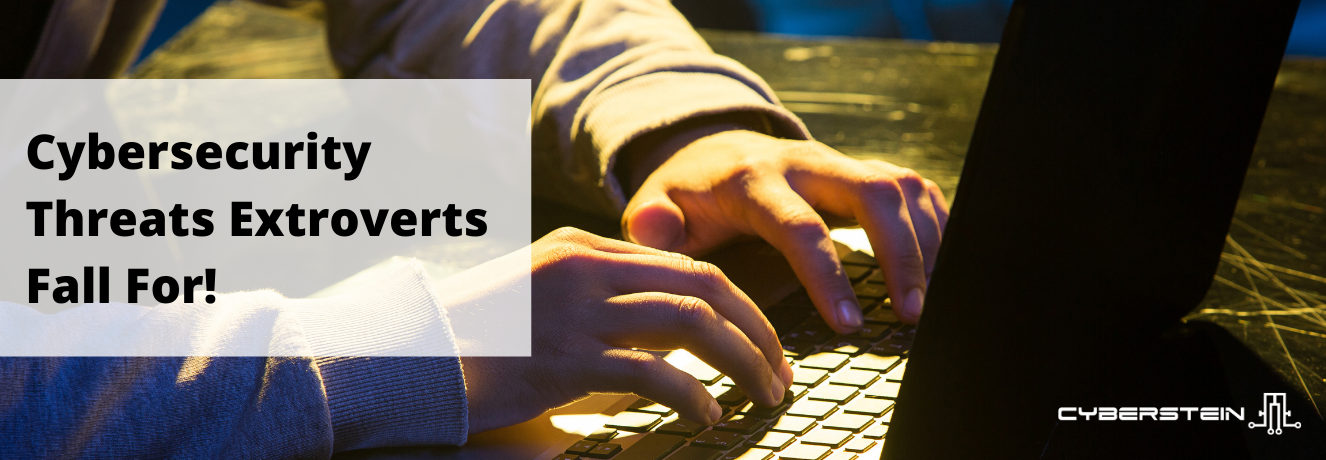
10 Mar Cybersecurity Threats Your Extroverted Employees Tend to Attract Based on Their MBTI!

Can your personality type make you more susceptible to different cybersecurity attacks? A 2019 study has revealed the link between one’s MBTI (Myers-Briggs Type Indicator) personality type and the vulnerability to different types of cybercrime.
The MBTI personality type assessment aims to assess people according to four preferences:
- Extraversion/Introversion: This shows where the individual gains their energy. Extraversion (E) refers to social interaction whilst Introversion (I) refers to alone time.
- Sensing/Intuition: This is indicative of how the individual learns. Sensors (S) prefer logic and hard facts. Whilst Intuitors (N) has a preference for gut feel and abstract concepts.
- Thinking/Feeling: Simply put, this shows how an individual makes decisions. Thinkers (T) make decisions based on logic and facts. Feelers (F) on the other hand, decide based on their emotions.
- Judging/Perceiving: In the MBTI world, this refers to the individual’s preference for either a more structured or open-ended lifestyle. Judgers (J) are more firm, direct and decisive. Perceivers (P) are often more adaptable with better listening skills.
Despite these differences, all personality types are likely to fall for cyber threats when they’re uneducated. When it comes to risks, anyone unacquainted with proper cybersecurity hygiene is at risk of a data breach. Curious to find out more?
Here are the different types of cybersecurity threats your employees will fall for based on their MBTI type.
A. Sensing

Extroverts can be divided further into two groups, Sensors, and Intuitors. Employees with a preference for sensing (i.e. ESFP, ESFJ, ESTP, ESTJ) are more likely to take risks when it comes to cybersecurity. For instance, a Sensor might be more likely to fall for an email that promises the reader ways to be more efficient.
Here are some cybersecurity habits that your employees with a preference for Sensing and Extraversion might have:
1. ESFP
Generally, the ESFP is more likely to follow both cybersecurity and IT rules. These individuals will also take action when they spot something that isn’t right. However, as a “Sensor-Feeler” (SF) type, these loyal and trusting personalities might be at a higher risk of falling for a phishing email. Especially one sent by someone claiming to be an authority figure or a supervisor.
Cybersecurity Tips for the ESFP
- Don’t send sensitive information over public wifi, even if it claims to be secure and requires a password.
- Try not to take things at face value. ESFP’s should be more vigilant online.
2. ESTP
ESTPs can be challenging when it comes to cybersecurity. These individuals need to be persuaded into believing that cybersecurity is imperative. But with proper cybersecurity education and training, these types are able to spot things that are out of the ordinary and take quick action. As a “Sensor-Thinking” (ST) type, these personality types are more likely to fall for a phishing email scam claiming to make factual promises.
Cybersecurity Tips for the ESTP
- When it comes to cyber hygiene, the rules apply to everyone, including your ESTPs. Learn more about the basics of cyber hygiene in AVNC’s past article, “5 Cyber Security Best Practices Every HR Executive Should Know”.
- If possible, get specific examples of what you should look out for either from your internal cybersecurity specialist or human resources department.
3. ESTJ
The ESTJ is a personality type that adheres strongly to the rules and systems in place around them. These individuals also seek to improve the rules and regulations set in place. In other words, these are the guys that will experiment to find different ways to make their cyber hygiene habits a lot more effective.
Cybersecurity Tips for the ESTJ
- Try not to use the same passwords repeatedly for different usernames and websites.
- Routine can be detrimental to your organization’s cybersecurity front. Try not to rely on a routine or do things the same way.
- Don’t be tempted to cut corners or skip steps in order to make things more efficient. This might result in potential breaches.
4. ESFJ
Just like their ESTJ counterparts, the ESFJ is aware of IT security policies and adheres them to the “T”. These are the employees who form their own cybersecurity habits. However, as a “Sensor-Feeler” (SF) type, these loyal and trusting personalities might be at a higher risk of falling for a phishing email. Especially one sent by someone claiming to be an authority figure or a supervisor.
Cybersecurity Tips for the ESFJ
- Compared to the other Extraverted-Sensors, the ESFJ is slightly more responsible when it comes to cybersecurity. However, like most routined individuals, the ESFJ should try to not stick to a routine or use the same passwords.
B. Intuitives

Intuitives on the other hand, are more likely to fall for a phishing email attack that plays on their emotions. Think a false charity email. Unlike sensors, these individuals generate ideas and possibilities based on the information they’ve gathered.
Here are some cybersecurity habits that your employees with a preference for Sensing and Intuition might have:
1. ENFP
When trained in cybersecurity, these employees are the first to realize if a security process is set in place. If you have an employee that types as an ENFP, it might be worthwhile to get them interested in cybersecurity. These personalities can often take cybersecurity seriously if someone manages to convince them that it should be part of the ENFP’s personal values.
Cybersecurity Tips for the ENFP
- Second guess emails that try to appeal to you emotionally. Try to double-check with other colleagues or even conduct a quick Google search to see the credibility of the sender.
- ENFPs tend to have a tendency to overlook. Before clicking into a dubious looking website.
Learn more about suspicious websites and how to stay safe from them here.
2. ENTP
ENTPs are known to be logical. These IT savvy individuals try to spend most of their time avoiding “silly” errors. But don’t let your guard down around them. Like most human beings, they’re still prone to error.
Cybersecurity Tips for the ENTP
- Their high levels of confidence might lead these personality types to believe that they’re above the rules set in place. Bending the rules might lead to possible cyber threats.
- Try to slow down and read emails properly. ENTPs, although highly intelligent, have a knack for skimming through details. By slowing down, you might learn something about the contents of that phishing email.
3. ENTJ
Much like the ENFP, the ENTJ individuals are the first to realize when a new security process has been put in place. Additionally, these logical types are loyal and faithful. Be prepared to answer a host of questions from the ENTJ. They want to understand security issues as much as they can.
Cybersecurity Tips for the ENTJ
- Before rushing into changing security processes. It’s best to find out more about what the process entails as well as the different aspects of security. Before attempting to change it.
4. ENFJ
ENFJ individuals are sociable people, motivated to create a better place for people they care about. This is why people with these personality types often adhere to cybersecurity rules and practice good cybersecurity hygiene if they’re made aware of the effects it has on their fellow colleagues.
Cybersecurity Tips for the ENFJ
- Try to clarify the different cybersecurity rules your organization has set in place. Don’t be afraid to ask.
- The practice is the key to remembering rules. Practice cybersecurity hygiene even when you’re home.
What’s your personality type? Share them with us in the comments section below!
Read: The Best Extroverted Personality Types Suited For Tech And Cybersecurity

